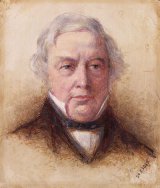Nightmare Abbey Page #10
Nightmare Abbey is an 1818 novella by Thomas Love Peacock, and his third long work of fiction to be published.
The rest of the party was in great surprise at Mr Asterias's movement, and some of them approached the window to see if the locality would tend to elucidate the mystery. Presently they saw him and Aquarius cautiously stealing along on the other side of the moat, but they saw nothing more; and Mr Asterias returning, told them, with accents of great disappointment, that he had had a glimpse of a mermaid, but she had eluded him in the darkness, and was gone, he presumed, to sup with some enamoured triton, in a submarine grotto. 'But, seriously, Mr Asterias,' said the Honourable Mr Listless, 'do you positively believe there are such things as mermaids?' MR ASTERIAS Most assuredly; and tritons too. THE HONOURABLE MR LISTLESS What! things that are half human and half fish? MR ASTERIAS Precisely. They are the oran-outangs of the sea. But I am persuaded that there are also complete sea men, differing in no respect from us, but that they are stupid, and covered with scales; for, though our organisation seems to exclude us essentially from the class of amphibious animals, yet anatomists well know that the foramen ovale may remain open in an adult, and that respiration is, in that case, not necessary to life: and how can it be otherwise explained that the Indian divers, employed in the pearl fishery, pass whole hours under the water; and that the famous Swedish gardener of Troningholm lived a day and a half under the ice without being drowned? A nereid, or mermaid, was taken in the year 1403 in a Dutch lake, and was in every respect like a French woman, except that she did not speak. Towards the end of the seventeenth century, an English ship, a hundred and fifty leagues from land, in the Greenland seas, discovered a flotilla of sixty or seventy little skiffs, in each of which was a triton, or sea man: at the approach of the English vessel the whole of them, seized with simultaneous fear, disappeared, skiffs and all, under the water, as if they had been a human variety of the nautilus. The illustrious Don Feijoo has preserved an authentic and well-attested story of a young Spaniard, named Francis de la Vega, who, bathing with some of his friends in June, 1674, suddenly dived under the sea and rose no more. His friends thought him drowned; they were plebeians and pious Catholics; but a philosopher might very legitimately have drawn the same conclusion. THE REVEREND MR LARYNX Nothing could be more logical. MR ASTERIAS Five years afterwards, some fishermen near Cadiz found in their nets a triton, or sea man; they spoke to him in several languages-- THE REVEREND MR LARYNX They were very learned fishermen. MR HILARY They had the gift of tongues by especial favour of their brother fisherman, Saint Peter. THE HONOURABLE MR LISTLESS Is Saint Peter the tutelar saint of Cadiz? (None of the company could answer this question, and MR ASTERIAS proceeded.) They spoke to him in several languages, but he was as mute as a fish. They handed him over to some holy friars, who exorcised him; but the devil was mute too. After some days he pronounced the name Lierganes. A monk took him to that village. His mother and brothers recognised and embraced him; but he was as insensible to their caresses as any other fish would have been. He had some scales on his body, which dropped off by degrees; but his skin was as hard and rough as shagreen. He stayed at home nine years, without recovering his speech or his reason: he then disappeared again; and one of his old acquaintance, some years after, saw him pop his head out of the water near the coast of the Asturias. These facts were certified by his brothers, and by Don Gaspardo de la Riba Aguero, Knight of Saint James, who lived near Lierganes, and often had the pleasure of our triton's company to dinner.--Pliny mentions an embassy of the Olyssiponians to Tiberius, to give him intelligence of a triton which had been heard playing on its shell in a certain cave; with several other authenticated facts on the subject of tritons and nereids. THE HONOURABLE MR LISTLESS You astonish me. I have been much on the sea-shore, in the season, but I do not think I ever saw a mermaid. (He rang, and summoned Fatout, who made his appearance half-seas-over.) Fatout! did I ever see a mermaid? FATOUT Mermaid! mer-r-m-m-aid! Ah! merry maid! Oui, monsieur! Yes, sir, very many. I vish dere vas von or two here in de kitchen--ma foi! Dey be all as melancholic as so many tombstone. THE HONOURABLE MR LISTLESS I mean, Fatout, an odd kind of human fish. FATOUT De odd fish! Ah, oui! I understand de phrase: ve have seen nothing else since ve left town--ma foi! THE HONOURABLE MR LISTLESS You seem to have a cup too much, sir. FATOUT Non, monsieur: de cup too little. De fen be very unwholesome, and I drink-a-de ponch vid Raven de butler, to keep out de bad air. THE HONOURABLE MR LISTLESS Fatout! I insist on your being sober. FATOUT Oui, monsieur; I vil be as sober as de révérendissime père Jean. I should be ver glad of de merry maid; but de butler be de odd fish, and he swim in de bowl de ponch. Ah! ah! I do recollect de leetle-a song:--'About fair maids, and about fair maids, and about my merry maids all.' (Fatout reeled out, singing.) THE HONOURABLE MR LISTLESS I am overwhelmed: I never saw the rascal in such a condition before. But will you allow me, Mr Asterias, to inquire into the cui bono of all the pains and expense you have incurred to discover a mermaid? The cui bono, sir, is the question I always take the liberty to ask when I see any one taking much trouble for any object. I am myself a sort of Signor Pococurante, and should like to know if there be any thing better or pleasanter, than the state of existing and doing nothing? MR ASTERIAS I have made many voyages, Mr Listless, to remote and barren shores: I have travelled over desert and inhospitable lands: I have defied danger--I have endured fatigue--I have submitted to privation. In the midst of these I have experienced pleasures which I would not at any time have exchanged for that of existing and doing nothing. I have known many evils, but I have never known the worst of all, which, as it seems to me, are those which are comprehended in the inexhaustible varieties of ennui: spleen, chagrin, vapours, blue devils, time-killing, discontent, misanthropy, and all their interminable train of fretfulness, querulousness, suspicions, jealousies, and fears, which have alike infected society, and the literature of society; and which would make an arctic ocean of the human mind, if the more humane pursuits of philosophy and science did not keep alive the better feelings and more valuable energies of our nature. THE HONOURABLE MR LISTLESS You are pleased to be severe upon our fashionable belles lettres. MR ASTERIAS Surely not without reason, when pirates, highwaymen, and other varieties of the extensive genus Marauder, are the only beau idéal of the active, as splenetic and railing misanthropy is of the speculative energy. A gloomy brow and a tragical voice seem to have been of late the characteristics of fashionable manners: and a morbid, withering, deadly, antisocial sirocco, loaded with moral and political despair, breathes through all the groves and valleys of the modern Parnassus; while science moves on in the calm dignity of its course, affording to youth delights equally pure and vivid--to maturity, calm and grateful occupation--to old age, the most pleasing recollections and inexhaustible materials of agreeable and salutary reflection; and, while its votary enjoys the disinterested pleasure of enlarging the intellect and increasing the comforts of society, he is himself independent of the caprices of human intercourse and the accidents of human fortune. Nature is his great and inexhaustible treasure. His days are always too short for his enjoyment: ennui is a stranger to his door. At peace with the world and with his own mind, he suffices to himself, makes all around him happy, and the close of his pleasing and beneficial existence is the evening of a beautiful day.[6]
Translation
Translate and read this book in other languages:
Select another language:
- - Select -
- 简体中文 (Chinese - Simplified)
- 繁體中文 (Chinese - Traditional)
- Español (Spanish)
- Esperanto (Esperanto)
- 日本語 (Japanese)
- Português (Portuguese)
- Deutsch (German)
- العربية (Arabic)
- Français (French)
- Русский (Russian)
- ಕನ್ನಡ (Kannada)
- 한국어 (Korean)
- עברית (Hebrew)
- Gaeilge (Irish)
- Українська (Ukrainian)
- اردو (Urdu)
- Magyar (Hungarian)
- मानक हिन्दी (Hindi)
- Indonesia (Indonesian)
- Italiano (Italian)
- தமிழ் (Tamil)
- Türkçe (Turkish)
- తెలుగు (Telugu)
- ภาษาไทย (Thai)
- Tiếng Việt (Vietnamese)
- Čeština (Czech)
- Polski (Polish)
- Bahasa Indonesia (Indonesian)
- Românește (Romanian)
- Nederlands (Dutch)
- Ελληνικά (Greek)
- Latinum (Latin)
- Svenska (Swedish)
- Dansk (Danish)
- Suomi (Finnish)
- فارسی (Persian)
- ייִדיש (Yiddish)
- հայերեն (Armenian)
- Norsk (Norwegian)
- English (English)
Citation
Use the citation below to add this book to your bibliography:
Style:MLAChicagoAPA
"Nightmare Abbey Books." Literature.com. STANDS4 LLC, 2024. Web. 23 Nov. 2024. <https://www.literature.com/book/nightmare_abbey_48>.




Discuss this Nightmare Abbey book with the community:
Report Comment
We're doing our best to make sure our content is useful, accurate and safe.
If by any chance you spot an inappropriate comment while navigating through our website please use this form to let us know, and we'll take care of it shortly.
Attachment
You need to be logged in to favorite.
Log In